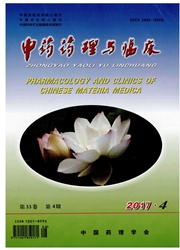

 中文摘要:
中文摘要:
目的:考察酒石酸对新生大鼠原代心肌细胞缺氧复氧损伤的保护作用。方法:大鼠乳鼠进行心肌细胞原代培养,MTT法检测心肌细胞的活力。复制心肌细胞缺氧复氧损伤模型,考察酒石酸对心肌细胞缺氧复氧损伤所致的LDH漏出的影响,并进一步分别采用流式细胞术及Western blot考察酒石酸对心肌细胞凋亡,cleaved-caspase 3,Akt及P-Akt的影响。结果:(1)酒石酸31.25~500μg/ml范围对原代心肌细胞活力不产生影响。酒石酸400μg/ml均可显著降低心肌细胞缺氧复氧损伤后LDH漏出率,而200、100、50μg/ml浓度时作用均不明显;(2)酒石酸400、200μg/ml有抑制心肌细胞缺氧复氧损伤所致凋亡百分数增加的趋势;(3)酒石酸200μg/ml均可显著抑制心肌细胞缺氧复氧所致的cleaved-caspase 3蛋白表达增加,而酒石酸400μg/ml有降低cleaved-caspase 3蛋白表达的趋势,无统计学差异;(4)酒石酸400μg/ml可显著增加心肌细胞的p-Akt蛋白表达,而酒石酸200μg/ml对p-Akt蛋白表达未见明显影响。结论:酒石酸可以抑制心肌细胞缺氧复氧损伤所致的坏死和凋亡,可能是通过激活Akt的磷酸化而实现的。
 英文摘要:
英文摘要:
To observe the protective effect of tartaric acid on cardiomyocytes subjected to ischemia/reperfusion injury and its underlying mechanism. Methods: Neonatal cardiomyocytes were isolated from one or two days old Sprague-Dawley rats. The cytotoxicity of tartaric acid on cardiomyocytes was determined by MTr assay. Hypoxia/reoxygenation-mduced cardiomyocytes injury was performed. The LDH leakage,apoptotic rate and expressions levels of cleaved caspase-3, Akt and p-Akt were observed. Results: ( 1 ) Tartaric acid at the concentrations of 31.25 -500μg/ml had no cytotoxlcities, as determined by MTT assay. Hypoxia/reoxygenation injury induced significant LDH release, but treatment with tartaric acid at the concentration of 400μg/ml significantly reduced cardiomyocytes LDH release rate ( P 〈 0.05 ), and treatments with tartaric acid at the concentrations of 200, 100, 50μg/ml had no obvious effects. (2) Treatments with tartaric acid at the concentrations of 400μg/ml and 200 μg/ml had tendency to reduce the number of apoptotic cells. (3) Treatment with tartaric acid at the concentration of 200μg/ml significantly downregulated the expression level of cleaved caspase-3 ( P 〈 0.05 ), and treatment with tartaric acid at the concentration of 400μg/ml had only a tendency to decrease the expression level of cleaved caspase-3. (4) Treatment with tartaric acid at the concentration of 400μg/ml significantly upregulated the expression of phosphorylatcd Akt, while treatment with tartaric acid at the concentration of 200μg/ml had no obvious effect. Conclusions: Tartaric acid have protective effect on cardiomyocytes injured by hypoxia/reoxygenation through activation of Akt.
 同期刊论文项目
同期刊论文项目
 同项目期刊论文
同项目期刊论文
 MicroRNA-384-5p regulates ischemia-induced cardioprotection by targeting phosphatidylinositol-4,5-bi
MicroRNA-384-5p regulates ischemia-induced cardioprotection by targeting phosphatidylinositol-4,5-bi 期刊信息
期刊信息
